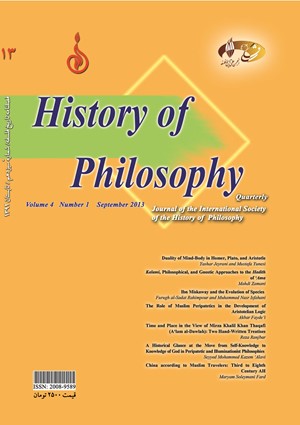-
-
List of Articles
-
Open Access Article
1 - Editor's Notes
Hossein Kalbasi Ashtari -
Open Access Article
2 - Duality of Mind-Body in Homer, Plato, and Aristotle
Yashar Jeirani -
Open Access Article
3 - Kalami, Philosophical, and Gnostic Approaches to the Hadith of ‘Ama
Mahdi Zamani -
Open Access Article
4 - Ibn Miskaway and the Evolution of Species
Mohammad Nasr Isfahani -
Open Access Article
5 - The Role of Muslim Peripatetics in the Development of Aristotelian Logic
Akbar Faydei -
Open Access Article
6 - Time and Place in the View of Mirza Khalil Khan Thaqafi (A‘lam al-awlah): Two Hand-Written Treatises
Reza Ranjbar -
Open Access Article
7 - A Historical Glance at the Move from Self-Knowledge to Knowledge of God in Peripatetic and Illuminationist Philosophies
Seyyed Mohammed Kazem Alavi -
Open Access Article
8 - China according to Muslim Travelers: First to Eighth Century AH
Maryam Soleimani Fard
-
The rights to this website are owned by the Raimag Press Management System.
Copyright © 2017-2026







